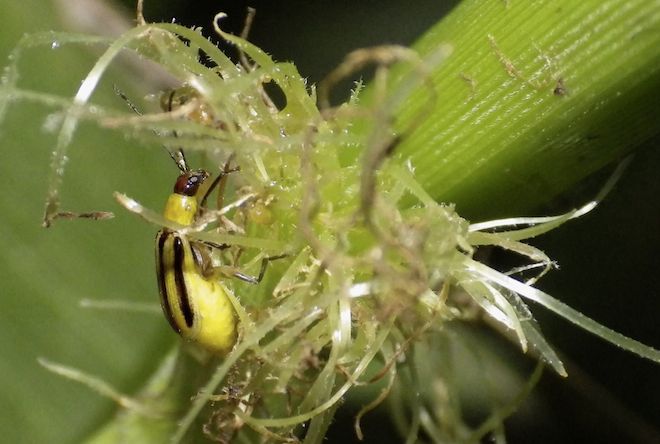 Adult corn rootworm beetle on a corn plant. Image: Sarah Zukoff/Flickr
Adult corn rootworm beetle on a corn plant. Image: Sarah Zukoff/Flickr
Thanks to CroneWit for alerting us to the evolution of rootworms resistant to genetically engineered "rootworm resistant corn," "Bt corn." In a rush to maximize short-term profits, farmers and seed companies defied guidelines established by the EPA and scientists, allowing rootworms to gain the upper hand. Brandon Keim, tells the tragic story, Voracious Worm Evolves to Eat Biotech Corn Engineered to Kill It in Wired, which highlights why we need a more independent EPA, and independent academic scientists to help protect and promote the common good, and why we should not let those led only by short-term profit motivation set agricultural, governmental, or other social policies by themselves.
Genetic engineers created Bt corn by incorporating the genes of the pesticide producing Bacillus thuringiensis into genes of the roots of traditional corn, vastly reducing the amount of pesticides needed, and increasing crop yields. Keim tells us that Bt corn is now used in three quarters of the U.S. crop.
 Democrats support science which helps keep our corn safe and healthy
Democrats support science which helps keep our corn safe and healthy
Scientists warned that unless farmers and regulators set aside reserve areas, to keep mixing in with the genes of rootworms not growing in Bt corn, resistance could emerge.
Key to effective management, said the scientists, were refuges set aside and planted with non-Bt corn. Within these fields, rootworms would remain susceptible to the Bt toxin. By mating with any Bt-resistant worms that chanced to evolve in neighboring fields, they’d prevent resistance from building up in the gene pool.
But, did seed companies and farmer listen? No! They brazenly defied these reasonable warnings from scientists that they plant up to 50% of their corn crops with non-BT corn. Seed companies even induced the EPA to set the guidelines down between 5% and 20%, and many farmers didn't even follow those reduced guidelines! Another lesson here is we need a more lobby resistant EPA.

So now, rootworms resistant to Bt corn have evolved independently in Iowa, Illinois, Minnesota, Nebraska, and South Dakota.
'A widespread increase in trait failure maybe just around the corner.'
In the new paper, Gassmann describes further incidents of Bt resistance in other parts of Iowa. He also found rootworms resistant to a second variety of Bt corn. Moreover, being resistant to one variety heightened the chances of resistance to another. That means corn engineered to produce multiple Bt toxins — so-called stacked varieties — won’t do much to slow the evolution of rootworm resistance, as was originally hoped.
Entomologist Bruce Tabashnik of the University of Arizona is pushing for the EPA to double current refuge requirements. But, “Biotech companies have successfully lobbied EPA for major reductions in refuge requirements,” say Tasbashnik.
Entomologist Elson Shields of Cornell University agrees. “Resistance was caused because the farmers did not plant the required refuges and the companies did not enforce the planting of refuges,” said Shields, who has written that “a widespread increase in trait failure may be just around the corner.”
Crop rotation is an additional strategy for disrupting rootworm resistant populations, but few crops are as profitable as corn. Continuous corn production is the perfect environment for growing resistant rootworms.

Keim's excellent and well documented article also describes how the seed companies enforced long legal delays on scientists trying to study rootworm resistance by denying them access to documents and crops. Professor Shields claims entomologists could have discovered this problem much earlier had seed companies cooperated.
“Once we had legal access, resistance was documented in a year,” Shields said. “We were seeing failures earlier but were not allowed to test for resistance.”
There’s a lesson to be learned for future crop traits, Shields said. Rootworm resistance was expected from the outset, but the Bt seed industry, seeking to maximize short-term profits, ignored outside scientists. The next pest-fighting trait “will fall under the same pressure,” said Shields, “and the insect will win. Always bet on the insect if there is not a smart deployment of the trait.”
Seriously, folks, here we see yet, another example of the vital role government regulation plays in our everyday life, and the production of food, and agricultural productivity. The Tea Party philosophy of "let-everyone-do-their-own-thing" is proven wrong, every day. Yesterday, we saw an article with a similar theme showing a little bit more funding for the NIH, and NSF might be able to yield enormous improvements in the research into the REST protein in Alzheimer's disease.
When Governor Rick Perry self destructed in the 2012 GOP presidential primaries by not being able to remember that the EPA was one of the three federal agencies he wanted to shut down, most people thought his main disqualifying factor was he was not intelligent enough to be president. Perhaps, a bigger disqualification should have been that he was wrong - dangerously wrong, blinded by zealous ideology.
 Cory the CornCob says: Help keep our corn supply safe with science - vote for Democrats!
Cory the CornCob says: Help keep our corn supply safe with science - vote for Democrats!
To win the upcoming November elections we have to tell stories like this around the water coolers at work, at church, in bed with our sweethearts, at family reunions, everywhere, and to everyone, we need independent scientists, the EPA, the NSF, the NIH, the FDA, the SEC, etc, and government to promote the common good, and protect our collective interests.
Next time some idiot at a social function, says something stupid like "let's shut down the EPA," you can respond, "WTH? and have the country overrun with voracious Bt resistant rootworms?!?!" And, everyone will laugh, and shake the heads, in disbelief, that anyone would be so stupid.
So let this be a lesson to anyone who should dare to defy science! Or, call for shutting down the EPA. Bwa, ha, ha. Woof, woof!
12:53 PM PT: Could folks help me think up some good poll responses for some Friday Night Fun for those of us not going out tonight? I know one of the responses already is going to be "I like my corn hot and slathered with butter?
If you come up with funny responses I'll think up the question - Right now I'm think of "How do you like you corn?" or "Which response best reflects your thoughts about corn" -- something general. - Thanks
Oh, anoher's going to be "Bt Corn? - Damn, I thought this article was going to be about Bit Coins, now I've got to call my broker back right away!"
1:38 PM PT: I was thanking CroneWit because she found this article and emailed it to me last night, or early this morning. Thanks again CroneWit.
5:06 PM PT: Corrected reference to CroneWit from he to she, and took the incorrect h out of her name. Sorry, CroneWit and thanks again for sending this article to me.


